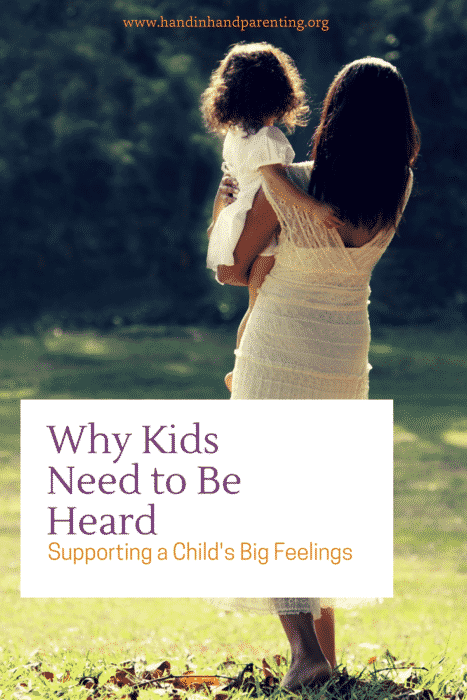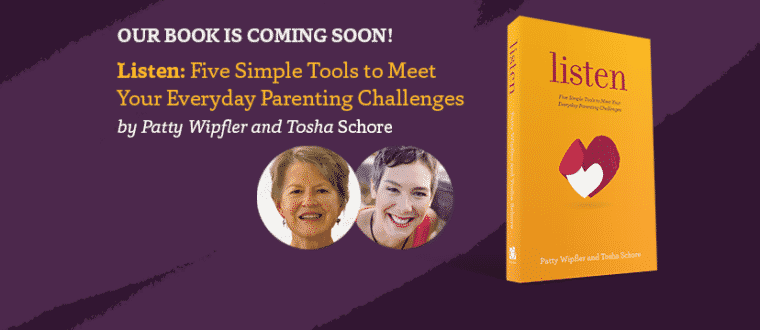 Sometimes the things that affect our children are not things that would upset us. In our bids to offer solutions, however well-meaning, we often forget to stop and listen. Yet one of the best solutions we can offer is space. Listening to children vent their feelings of wrongdoing or injustice can be all they need to recover themselves and even problem solve without much guidance at all.
Sometimes the things that affect our children are not things that would upset us. In our bids to offer solutions, however well-meaning, we often forget to stop and listen. Yet one of the best solutions we can offer is space. Listening to children vent their feelings of wrongdoing or injustice can be all they need to recover themselves and even problem solve without much guidance at all.
My younger daughter, who is 6 years old, came back from school crying, recently. When I asked her what happened, she told me that one of her teachers was “bad.”
“She gave pictures to the other group to color them and to one in my group. But she didn't give me one,” she explained.
Then, she started to cry really hard.
I told myself to get ready for some Staylistening! I looked at her with empathy and love. I made a direct eye contact and listened to her as she passionately showed me her feelings about this injustice.
I concentrated on trying to really show her that I understood what she was going through. I told her that I knew it felt very difficult. She kept crying for a while. When she calmed down a little bit, I told her that I was right there, listening.
She opened up, telling me more details about the issue. There were two boys in her group who had been talking and playing, and so the teacher punished the whole group by not giving them pictures (except for that special one!)
 “I wasn't talking mummy, but she didn't give me a picture!” she told me, and she started crying harder and louder. I kept up my eye contact, showing that I cared about what she was talking and crying about.
“I wasn't talking mummy, but she didn't give me a picture!” she told me, and she started crying harder and louder. I kept up my eye contact, showing that I cared about what she was talking and crying about.
To be honest, I wasn't happy with what the teacher did. In a second, I had an idea about writing to the principal about what I felt was an unfair action with the first graders. But then I realized that this wasn't the time to think about the teacher, and I tried to put my feelings and thoughts aside and just focus on her feelings by giving her my undivided attention and listening.
There were plenty of moments I could have jumped in and offered my thinking. While she was crying, she said, “I don't like this teacher. I don't want to go to school. If she's going to be our teacher, I won’t go. If she isn’t there, I'll go,” for instance.
But I didn't comment on the idea of not going to school, instead, I remained focused on her feelings. “It must be hard to feel that way, tell me more about it sweetie,” I said. She cried loudly again and then suddenly, she stopped. With a big smile on her face she said, “I'm going to pull your shirt!”
The change in emotion was quite unexpected, but I responded playfully to her funny threat. “No! No please don't!” I said, pretending to be scared.
She giggled as I tried to make a bumbled escape, running away from her in slow motion so that she often succeeded in grabbing me. We ran this way and that way across the apartment as I tried to escape from her, both of us giggling and laughing lots. The episode was forgotten for that night.
When I woke her up the next morning, I expected her to bring it up again, and perhaps refuse to go to school. But she didn't. In fact, she only brought it up once we were having lunch, much later. All she said was, “I don't like that teacher mommy. I want some French fries,” just like that, with no pauses.
“Sure honey,” I said, and was it, she never brought it up again.
Every time I do Staylistening with my daughter, I get really amazed at that switch of mood. It happens when she’s offloaded great amounts of emotions and is like a signal to me that she has worked off those big, upsetting feelings and is ready to move on.
Staylistening is a powerful way to hold space for a child. When we move away from fixing and lecturing and into listening we anchor our children as they offload, giving them a warm and secure place to process those feelings.
Learn this practical and powerful parenting approach and see how supporting your children's emotions brings you closer. Hand in Hand Parenting's Book Listen: Five Simple Ways to Meet Your Parenting Challenges is available now.

